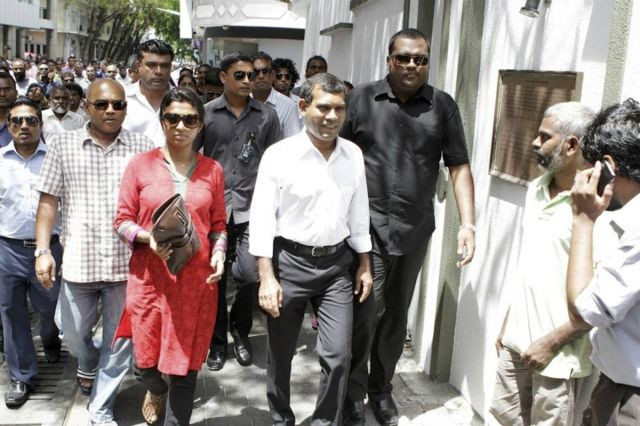India Unlikely To Ask Former Maldives President To Leave High Commission: Report

Despite mounting pressure on India to facilitate the arrest of former Maldivian President Mohamed Nasheed, who has taken refuge at the Indian High Commission in Male, the capital, the Indian government is unlikely to ask the president to leave, Indian media has reported.
Forty-five-year-old Nasheed took refuge at the Indian High Commission in Male on Feb. 13 after a magistrate ordered his arrest for failure to attend a court hearing on charges of illegally detaining a judge during his tenure in office. Nasheed had ordered the judge’s arrest on charges of deliberately obstructing investigations of political figures linked to a previous government.
The Hulhumale Magistrate Court on Monday gave 4:00 p.m. Wednesday deadline for Nasheed to appear before the court. Nasheed faces a maximum penalty of three years' imprisonment or banishment to a remote island if found guilty of the charges.
Indian External Affairs Minister Salman Khurshid spoke on Sunday to his Maldivian counterpart Abdul Samad Abdullah to resolve the situation, the Press Trust of India (PTI) reported, citing official sources.
However the details of their conversation were not made public.
The Maldivian Foreign Ministry informed the Indian High Commission of the warrant instructing the Maldives Police Service to produce Nasheed before the court by Wednesday, the Times of India reported.
"The [Indian] ministry of external affairs is looking into it," Indian High Commissioner in Maldives D.M. Mulay told the Times of India.
There are "clear international conventions" that don't permit the Maldivian authorities to serve an arrest warrant at the High Commission, the report added, quoting an unnamed diplomat.
"Anyway, we are firm on our stand that the Maldivian election should be inclusive,” the source added.
The PTI reported, citing sources in New Delhi, that India is unlikely to ask Nasheed to leave the mission because the government feels it was up to the Maldivian leader to decide whether to stay or not.
Maldivian President Mohamed Waheed's office said a strong note of protest was issued to the Indian High Commissioner for "harboring a fugitive in the embassy premise from where Nasheed is inciting and calling for unrest and violence in the streets.”
The Indian mission responded by saying that “no political meetings and activities have been allowed in the mission premises during the presence of the former president.”
"Only limited visitors are allowed to meet the former president on strict need basis," the statement added.
The Maldives was thrown into political turmoil in February 2012 when Nasheed, the country's first democratically elected president, was ousted in a military coup.
Maldivian President Waheed, who had been vice-president to Nasheed, replaced his predecessor following the ouster. Nasheed says he does not recognize the new government and has called for new elections.
Democratic elections were introduced in the country in 2008, ending former President Maumoon Abdul Gayoom's 30-year autocratic rule. Nasheed had been a democracy activist and political prisoner before becoming president in the first multiparty election in 2008.
Nasheed's Maldivian Democratic Party maintains that the case against him is aimed at sabotaging his campaign efforts for the upcoming presidential elections.
However, President Waheed said the court's decision has nothing to do with his government.
"Upholding the rule of law means nobody is above the law. I would like to assure the people of Maldives that law and order will be maintained," he said.
He noted that the Maldives Election Commission has announced Sept. 7 as the date for the next presidential election.
"I believe that it is in the national interest of Maldives to hold a free, fair and inclusive election this year in which all political parties are allowed to participate, including smaller political parties," Waheed said in a statement, as reported by the PTI.
The Maldives, located off the southern Indian coast and home to about 300,000 people, is a chain of nearly 1,200 islands.
Political unrest in the recent years has led to the emergence of Islamic fundamentalists and fears that Islamic hardliners may grow influential, especially on the more-remote islands.
© Copyright IBTimes 2024. All rights reserved.






















